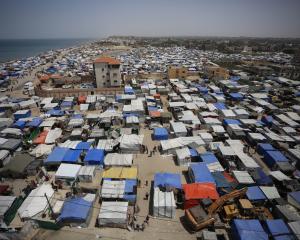Finance Minister Yanis Varoufakis met Jeroen Dijsselbloem, head of the euro zone finance ministers' group, for what both described as "constructive" discussions.
However, Greek media seized on signs of frosty body language between the two men and the hour-long meeting appeared to do nothing to bridge the gap between the government of Prime Minister Alexis Tsipras and European partners.
The meeting marked the start of Greece's drive to persuade its partners to loosen the strict terms of its 240-billion-euro bailout, which has imposed years of harsh austerity on the country in its worst crisis in decades. It precedes visits by Tsipras and Varoufakis to London, Paris and Rome next week.
Although neither France nor Italy have shown any sign of accepting the new government's demand to write off part of its 320 billion-euro debt, they have both previously called for a change of course from German-style budget austerity.
After a volatile week in which banking stocks fell by as much as 40 percent, financial markets, which recovered some ground on Thursday, fell back, with the main Athens stock market index down 1.6 percent. Greek 10-year yields were down 22 basis points at 10.37 percent but still well above levels seen before Sunday's election.
Varoufakis said Greece had no intention of cooperating with a mission from the lending "troika" of the European Union, European Central Bank and International Monetary Fund, and would not seek an extension to a Feb. 28 deadline with euro zone lenders.
"This platform enabled us to win the confidence of the Greek people," he told reporters after the meeting. "Our first action as a government will not be to reject the rationale of questioning this programme through a request to extend it."
The Tsipras government has taken office showing it wants to respect its election campaign pledges, halting privatisations, reinstating hundreds of laid-off public sector workers and increasing low-income pensions.
On Friday, Energy Minister Panagiotis Lafazanis said it was examining its options on a Canadian-run gold mine, one of the biggest foreign investment projects in Greece, which the ruling leftwing Syriza party opposes.
Varoufakis gave no indication of what Greece, which must be under an EU/IMF bailout programme to ensure its banks have continued access to ECB funding, would do if it cannot reach an agreement by the deadline. The centre-right New Democracy party, which lost power in Sunday's election, said the new government "does not understand what is about to do."
Dijsselbloem said a decision on the bailout deadline would be reached before the end of February but rejected Greece's push for a special conference on debt, saying a conference already existed in the form of the Eurogroup of euro zone finance ministers.
Athens is waiting on a final bailout tranche of 7.2 billion euros ($8.13 billion) and has been shut out of international bond markets. It faces around 10 billion euros in debt repayments this summer.
German Finance Minister Wolfgang Schaeuble repeated a message hammered home by Berlin since the new Greek government's arrival, saying German generosity had already been stretched to its limit and that it could not accept "blackmail".
France has rejected suggestions that part of the Greek debt could be written off but has been more open to the possibility of offering other forms of relief such as pushing back debt maturity or cutting interest rates.
Varoufakis said he had assured Dijsselbloem that Athens planned to implement reforms to make the economy more competitive and stick to balanced budgets, but it would not accept a "self-fed crisis" of deflation and non-viable debt.
In turn, Dijsselbloem said he had told the new government to respect the terms of the existing agreement between Greece and the euro zone and warned against taking unilateral steps, saying it was important not to reverse progress made so far.
He said euro zone partners were ready to continue supporting Greece until it can begin borrowing on the markets again "provided that Greece fully complies with the requirements and objectives of the programme".












